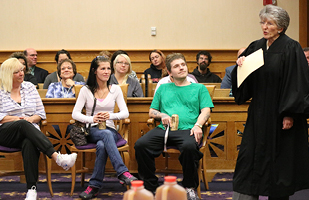Retiring Judge Adds to Legacy with New Juvenile Drug Court

Retiring Ottawa County Juvenile and Probate Judge Kathleen Giesler said she is proud that her juvenile recovery court has helped so many people.

Retiring Ottawa County Juvenile and Probate Judge Kathleen Giesler said she is proud that her juvenile recovery court has helped so many people.
As a final act in her decades of service, a northern Ohio judge created a specialized docket to continue the positive impact she initiated with alternative court programs more than a decade ago.
Prior to her retirement next week, Ottawa County Juvenile and Probate Judge Kathleen Giesler received full certification from the Ohio Supreme Court for a “Juvenile Recovery Court.”
“I’ve been doing a lot of reflecting lately, and this is one of the things I’m so proud of,” said Judge Giesler. “It’s helped a lot of people.”
The drug court will be inherited by incoming Judge Frederick Hany II, who begins his six-year term on Feb. 9.
Having already initiated a family dependency court in 2007, Judge Giesler, a jurist of 18 years and a magistrate for 12 more, has taken steps to reform how the criminal justice system operates in the rural community. Those breakthroughs fall in line with her stature as the county’s first female judge when she took office in 2003.
On top of getting approved by the Supreme Court’s Specialized Dockets Commission for her specialty courts, she’s also developed other programs to address issues impacting youths who end up in the judicial system, including ones dedicated to mental health matters and truancy.
“We wanted to analyze and make sure we’re serving the kids that needed the most help,” Judge Giesler said.
As the judge and her treatment team got more immersed with the other programs, staff members noticed a lack of consistent, intensive outpatient treatment for juveniles with substance use issues.
“Three years ago, we needed to switch and do things differently,” said Ann Johnson, the court’s specialized dockets coordinator. “Kids weren’t able to get regularly treated and the area had no juvenile drug groups. There weren’t a lot of options.”
With the infrastructure, personnel, and familiarity of establishing a specialty program already in place, including in-house drug testing, those foundations allowed the court to maintain a smaller treatment staff, yet be more intimate and less intimidating for offenders.
That ability to keep a tight circle is critical to building trust -- not only for the participants, but for parents and family members, as well. With responsibilities and supervision more centralized, probation officers are able to have more access and communication with families to address issues at home, where instability is the origin of most problems that end up before the court, according to officials.
“The overlying issue tends to be a lack of supervision and accountability in their personal lives,” said probation officer William Lehr. “Parents aren’t aware of how ing-depth a drug problem might be.”
Families play a vital role as part of the year-long rehabilitative program that gives youth the opportunity to have felony charges dismissed and sealed.
“Parents have huge obligations,” said Mike Reynolds, the program’s other designated probation officer. “We’re trying to recondition them and teach them on what they can do to help.”
The maximum capacity of 10 participants in the program is in large part to ensure that each individual can get the necessary help and holistic treatment they need to alter their detrimental tendencies.
For a judge who has seen numerous people come before her as reclamation projects and reformed right in front of her eyes, seeing youthful promise realized as part of a transformation through alternative probationary programs is the lasting hallmark of a three-decade legacy on the bench.
“That’s the wonder of specialized dockets. You really get to care about them,” Judge Giesler said.


